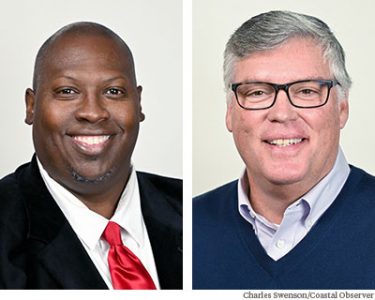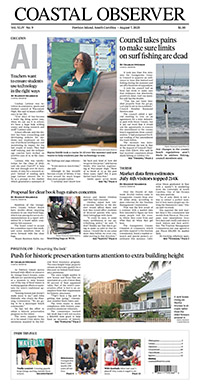Politics
Questions for the GOP candidates for sheriff

Darryel Carr, a former deputy, and Carter Weaver, the acting sheriff, are seeking the GOP nomination in a special election to fill the unexpired term of Sheriff Lane Cribb, who died in September. There will be no Democrat on the Feb. 4 ballot. Barring a write-in campaign, the sheriff will be selected in Tuesday’s Republican Party primary.
Carr, 52, lives in Pawleys Island. He has a bachelor’s degree from Ashwood University. He was a deputy sheriff from 1992 to 2001. He is the owner of a tour bus company and a driver’s school.
Weaver, 54, lives in Murrells Inlet. He has a bachelor’s degree from Coastal Carolina University and a law degree from the Charleston School of Law. He is a graduate of the FBI National Academy. He was an agent with the State Law Enforcement Division from 1986 to 2001, assistant sheriff from 2001 to 2019 and became acting sheriff in September.
What is the No. 1 challenge for the sheriff’s office?
Carr: The disconnect between communities and law enforcement. We need to build that bridge between all communities. When you go out to the northern part of the county, they feel like they don’t get as much representation. Then you come over here, they sometimes feel like you’re not doing enough. It’s just that disconnect between the communities and law enforcement.
Basically, it starts with the top. We’ve got to have a lot of educational programs going around the county.
One of my platforms is the traffic unit. Carter said his traffic unit is going to do nothing but write tickets. I disagree with that. My traffic unit would be to write tickets, to also work accidents to keep the highway moving and a traffic unit with motorcycles. To go further than that, the traffic unit would also have an educational detail to go with it. Laws change all the time. We’ll go around to the schools, get with the school resource officers. When they have career day, my officers would be there to educate the students on laws they should be following when they’re in their car. And, they’d go to different churches to do outreach programs to educate moms how to put car seats in.
Weaver: It’s two things, but it’s all rolled into one: recruitment and retention. That is the biggest obstacle facing any law enforcement agency in the country right now.
We create a very good working environment. We are competitive right now in our salaries and we are going to remain competitive one way or another.
The other thing you do, you have to find a balance. We will never reduce the hiring requirements. You would think you were going to make a million dollars a year when you go through our process. The paperwork that you have to file during the employment application. You have to be polygraphed. You have to be drug tested. You have to go through a psychological review. You have to have oral interviews. You have to do a written aptitude test. By the time you get to my office as a candidate, out of 10 we may get two.
Some people that are running for sheriff would like to see some of those qualifications go away. Absolutely not. We’re not doing that. Whether we have a retention problem or not, the bottom line is we’ve got to have good people out there. Our process ensures that.
We lose people to the counties within 30 or 40 miles of us. We had the pay increase a year and a half ago, and now I’m advocating that we stay ahead of the curve by bringing back merit raises. If you come to work and do your job every day, you’re only meeting the standards. You will not see an increase in pay. If you come in and exceed those standards, then you will see an increase. Merit is the key and that is so simply implemented.
Participants in a series of community conversations over the last year raised concerns about the level of law enforcement and questioned whether the current resources are equitably distributed. How do you respond to that?
Carr: Coming in as a new sheriff, I have to learn to do more with less until I gain the public’s trust. We have to learn to do the services on both ends of the county with what we have. One way I would enhance that is to restart the reserve program. There are always people in the community who want to be part of law enforcement. It won’t hurt the budget any. You’ll see more deputies, have more deputies in your community, and then the deputies will know what’s going on in the communities. If something happens, they’ll know who to talk to. That’s all community-based policing. Building that reserve program, that would help build the department without putting a big strain on the budget, then help serve different parts of the county on both sides of the bridges.
Weaver: As far as the distribution of resources and assets, we have a deputy in every area. We have seven geographic areas, and they’re divided by the traditional number of incidents that they create. We know historically how much activity is going to occur. It’s not based on how much the houses are worth or how much the people make. It’s simply based on activity, but at the same time there’s a deputy in every area of the county.
We provide law enforcement, all judicial, all communications, all corrections. We do everything. We have 814 square miles in the county. We have a lot of area to cover, but we do it well. Our low crime rate shows that and our high clearance rate numbers show that.
I appreciate when someone brings that up. I’m the same. I never see them ride through my neighborhood at night, but the bottom line is they’re there.
Many people don’t believe there is enough enforcement of the speed limit on Highway 17. A few also say there is too much. What more can or should be done?
Carr: If someone’s saying there’s too much traffic enforcement, then someone’s probably getting more tickets.
We have to stay out there. We have to have a constant presence enforcing traffic. That will slow traffic down. I’m not saying you have to write any and everybody. When I was in traffic, I used to write between 140 and 150 tickets a month. My courtroom was full, but my courtroom wasn’t full of someone contesting tickets. My courtroom was full mostly of people wanting reduced fines. I have nothing to do with fines, that’s set through the court.
Not everybody got a ticket. I wrote a whole lot of warning tickets. When you’re a sheriff’s department, your warning ticket book should be lower than your uniform traffic tickets, because you’re a sheriff’s department.
The motorcycle units are there to get through traffic quicker, get to an accident, and the motorcycle cops are there to educate. A lot of accidents happen on 17 because [drivers are] not paying attention, so we have educational programs to tell people, stop rubbernecking. Pay attention to what you’re doing.
When I was in charge of traffic, I worked accidents when I came up on one. Also I worked accidents all over the county for the South Carolina Highway Patrol. Nine times out of 10 if an accident happens over here on Waccamaw Neck you have two or three deputies over here. Who’s going to be the first one on the scene? Most of the time it’s the deputy. If you take 10 or 15 minutes to get to the accident, you make sure you check the people who are injured, the fire and rescue come in, you could clear the accident up within 30 to 40 minutes instead of waiting for highway patrol. They don’t have the manpower. You’re waiting on them 30 or 45 minutes, sometimes longer than that depending on what’s going on, to work that accident.
I want to build a relationship with highway patrol. Sometimes they get the call before we get the call, but if we have a unit in the area we’ll cover it. We’ve got to learn to work together. It will work a whole lot smoother and citizens will be pleased with the service.
Weaver: Research the statistics of the number of traffic accidents between the bridge in Georgetown and 707 in Murrells Inlet. You’re talking about numbers in the 700s for traffic accidents. If we had 700 of anything else occurring in a year within that geographical area, there would be an uproar.
I’m sure we can blame a lot of it on texting and driving. We can blame a lot of it on the road system not being as good as it should be. We can blame it on a lot of things, but the thing I can control is speed. I will control the speed.
We just got two traffic grant officers awarded to the Georgetown County Sheriff’s Office, so obviously the state agrees we have a traffic issue and not enough is being done.
I think speed is a major contributor and that makes it a life or property issue.
We have about 50 other radar units now in vehicles, plus these other two traffic officers. For the two traffic officers, that’s all they’ll do. They don’t answer calls for service. They don’t pull funerals. They don’t do anything other than slow people down through traffic enforcement. It will be felt and seen.
Drugs and drug-related crime are persistent, yet changing problems. How should law enforcement respond?
Carr: We need to have our own, in-house narcotics investigations team. When I was with the sheriff’s office, I was in narcotics. We had one of the biggest cases in Georgetown County because we worked from the ground up. If you have a drug unit that’s within your department, you have more say-so. We worked this case and worked this case and had one of the biggest drug busts in Georgetown County.
It’s not only going out and putting the guy who’s using drugs in jail. We have to form some type of relationship on the federal level to help control it. I don’t think you can ever stop it.
Another thing about the ones that are using it, we need partnerships with facilities to put them in to help wean them off of what they’re on. Some of it is their fault, but a lot of people, it’s not their fault they’re hooked. If we can facilitate with different agencies to get them in there, get them weaned off whatever they’re on. If you lock them up, they go to jail, they serve whatever time, when they come out what are they going back to? To the same place that they know. We’ve got to learn to help people in those situations.
Weaver: I don’t think enough is being done. It is so easy for law enforcement to go out here and grab a headline by arresting some low-level punk on the side of the road or out of their car. We need to deal with those people because they’re causing quality of life issues. I get that.
There’s too much of that being done and not enough of holding the people accountable who got us into this opioid problem. That’s the people writing the prescriptions. Opioid problems with prescriptions being over-written, in my opinion. Those are the people who need to be held accountable.
Hardly anything you’ve seen over the past few years talks about those script writers. Obviously we’re talking about doctors. They need to go to jail. It does not need to be a civil fine.
There does not need to be a discussion. If they are violating the law, by writing these illegal prescriptions, the law needs to be enforced and they need to go to jail.
It’s not something that’s popular and that’s why it’s not discussed.
School resource officers started out as an educational program, but are now a security program and are often involved in policing behavior. What is the proper role for SROs?
Carr: Under my program, I want to make them more of mentors. That would help cut down on the bullying rate and cut down on the suicide rate in our schools. The student will have a friend in the school.
I have kids and sometimes kids don’t want to come talk to me about this stuff. If they feel like they have a friend at school, they’ll come talk to him. That would help cut crime. If they hear something that’s going on, the first thing they’re going to do is go to their friend, the school resource officer, that they can trust.
I want to go back to having some part of the school resource officers doing educational programs and teaching, especially on the elementary level. When you are there in uniform, the elementary kids look at it differently than the middle school and high school. If we could be a friend and educate and have classes in the elementary school level, I think that would help tremendously once they grow up into the middle school and the high school.
Weaver: I think society determines the role. Society has always determined the role for law enforcement. Society has determined the role of the school resource officer, and that is making sure the children are safe when they’re on the grounds or in the building. That is not going to decrease.
It’s very hard. If we could find a way to put a magic bubble around these children, we would.
We are going to continue on the route we are. We use more than just school resource officers. There’s not a week that goes by that we’re not dealing with an issue at a school in Georgetown County. The school resource officers alone and by themselves can’t handle that. There’s multiple layers, from my office to criminal investigations to command staff to patrol. It is a constant.
Maybe there needs to be some serious discussion about what are the roles of a school district. What is the role of law enforcement and, more importantly, what is the role of a parent?
County Council is considering a $36 million proposal to build a new jail. What is the benefit of this project?
Carr: I wasn’t in on that so I really can’t speak too much on that. I guess they’re saying that we have outgrown what we have. If it’s going to benefit the county to hold more people and be secure, it’s fine if we need it.
What’s going on with the jail we have now? Can we make some renovations instead of building a brand new jail and cut some of the cost and expand what we have?
Weaver: County government has had an architectural study in their possession that occurred three years ago. Out of respect to the process I will let that now three-year-old document stand for itself. It sure ain’t got any better.
It wasn’t a $36 million question three years ago. I can promise you it’s not going to be a $36 million question three years from now. It was less than 36 three years ago and it will be more than 36 three years from now. The clock’s ticking.
We do run the detention center. We do a fantastic job, but it is a huge liability and it needs to be treated as such.
You can keep the jail you have and you are going to start writing checks for liabilities. And it’s liabilities we can’t control due to construction.




